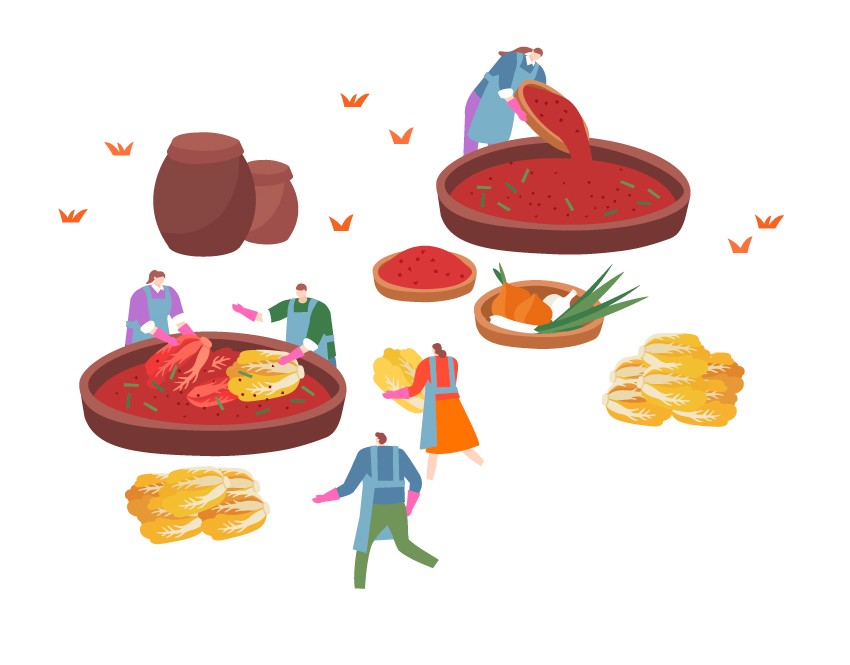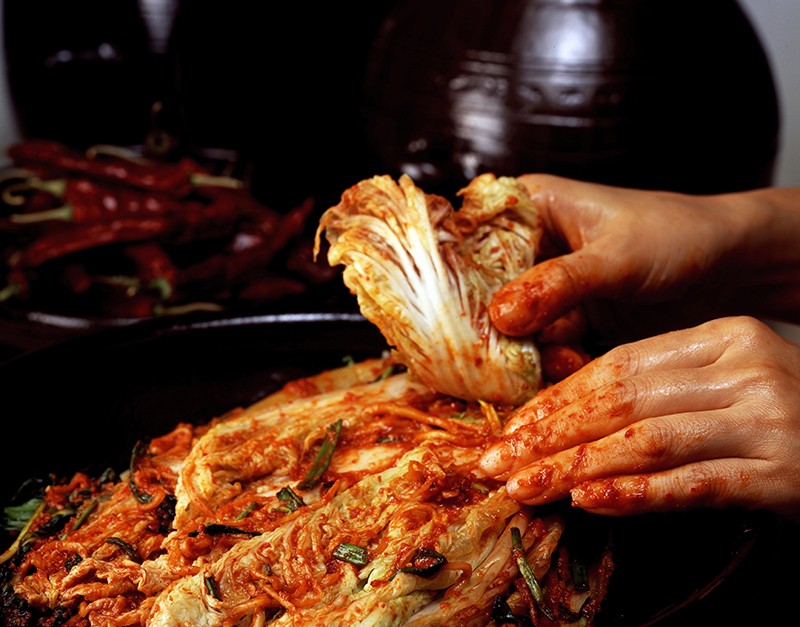한식 읽기 좋은 날
Vol 57. Fermentation and Kimchi
Even with the World’s Most Sumptuous Foods, I Can’t Live without Kimchi
HANSIK at the Sayings
The song “Kimchi Anthem,” which was released in 1985 by Jeong Kwangtae, shows just how much Koreans love the titular food (“If there was no kimchi, how would I eat rice? Even with the most sumptuous foods in the world, if there is no kimchi, the meal feels empty”). Even the simplest of meals includes one or more types of kimchi made with cabbage, radishes, or green onion, showing the prevalence of kimchi in people’s daily lives.
Article Noh Yunyoung (Editorial Team) Sources Encyclopedia of Seasonal Customs of Korea (National Folk Museum of Korea), Encyclopedia of Korean Culture

Half of winter’s food supply
For Koreans, kimchi is a side dish that is served with every meal. It is the food that is mentioned first and the most frequently when introducing Korean cuisine overseas. The ingredients, format, and way of eating kimchi has changed over time. Some things, however, have remained the same: namely, Koreans’ passion for it. Koreans’ love of kimchi is especially evident in the many sayings involving their favorite food that are still used today, which offer insight on how kimchi has been understood by the public for centuries.
“Kimjang makes up half of a winter’s food supply” is perhaps the most accurate summary of how pre-modern Koreans thought about kimchi. Kimjang was done at the start of winter to prepare for the next few cold months. This is important because, in the days before refrigerators and greenhouses, kimchi was usually the only source of vegetables. Kimchi was a favorite of the commoner class for its high nutritional value (vitamins, lactic acid bacteria, etc.) and versatility/ability to accompany virtually any side dish. Therefore, declaring that kimchi is half of the winter’s food supply was not an overstatement. “Those who are poor eat a lot of kimchi” shows how kimchi was an indispensable part of the common people’s diet. It shows that, amid the difficulty in procuring foodstuffs during the winter, kimchi was the main (or, in extreme circumstances, the only) side dish to accompany rice.
There are also sayings that emphasize the timing of kimjang. “Kimjang should be done late in a plentiful harvest and early in a famine” shows how kimchi served as a substitute when other foods were in short supply. “Kimjang should be done on the first day of winter” emphasizes that kimchi-making, which was traditionally done on the first day of winter (by the lunar calendar), should not be put off, because once winter deepens, there was no way of obtaining the fresh vegetables needed to make it. “If kimjang cabbage softens, there is no peace in the household” is another saying on timing. It served as a reminder that cabbages can spoil if they are not properly managed before kimjang day.

Sayings that reflect traditional customs and culture
“Drinking kimchi broth when the neighbor has no intention of giving you rice cakes” is another favorite kimchi saying. One point to keep in mind is that, here, “kimchi broth” is not a reference to kimchi jjigae (kimchi stew) but dongchimi. Rice cakes, called tteok in Korean, are rice- and labor-intensive: therefore, in premodern times, they could be made only a few times per year. Rice cakes were usually made for village occasions or holidays and shared with one’s neighbors. To prevent the rice cake from getting caught in one’s throat, it was common practice to eat it with dongchimi soup. Given this custom, it would have been very strange to take a drink of dongchimi before receiving the neighbor’s rice cake. The saying, therefore, is a sarcastic poke at someone who expects something from someone else regardless of the other person’s intensions—which is also embodied by the sayings “searching for kimchi broth after hearing the sound of the rice cake mortar” and “drinking kimchi broth after hearing the pounding of the neighbor’s rice cake mortar.” Another thing we can learn from these sayings is that ancient Koreans enjoyed pairing rice cakes with dongchimi, something that is not very common today.
There are also sayings in which dongchimi is the main character. “Stroking one’s beard after drinking kimchi broth” refers to someone who, after doing something that anyone could have done, acts as if they have achieved something remarkable. “Drinking the remains of kimchi broth served to a traveler is undesirable, but giving it away is a waste” refers to people’s tendency to not want to give to others, even if they have no use for the object themselves.
Other sayings about kimchi are metaphors for outward appearance or a person’s actions. “Like snatching someone’s kimchi broth, like a trembling beggar” is a derogatory comment about someone trembling from the cold while no one else is bothered by the temperature. “Dribbling kimchi stew like a warm corpse” is another derogatory epithet that means even those who are so old that they have difficulty walking enjoy a bowl of dongchimi so much that they eat it regardless of whether they spill some of the soup. “Like a yangban eating kimchi stew” refers to someone who is trying to act genteel, like a member of the upper class.
One frequently-used saying is “like green onion kimchi (pakimchi),” which refers to the first step of making green onion kimchi: submerging the green onions in salt or aekjeot (fish sauce) to “bring it down” or soften it. It describes someone who is so tired that they resemble long strands of green onion kimchi draped over a plate. “Empty kimchi jar” compares the appearance of someone whose eyes are sunken in because of hunger or illness to a kimchi jar that has been scraped clean of its contents and is usually used to describe an object that is no longer useful. “Yeolmukimchi (young summer radish kimchi) smells foul before it is ripe” describes someone who has not yet reached adulthood having acquired undesirable habits at an early age, much like how young summer radish kimchi is prone to smelling bad before it ripens.
As these examples how, sayings involving kimchi offer a diverse pool of insights on traditional Korean customs and culture because kimchi has been an important element of Korea’s culinary culture for such a long time. As this centuries-old favorite is now imported to many other countries, we may not be far from the day when all of the sayings in this article are used by people all over the world.



